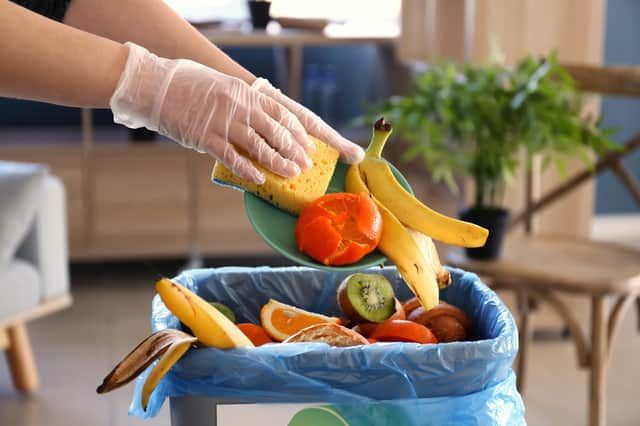Going Green: Tackling the mountain of food waste each day


We’re all guilty of chucking food in the bin – whether that’s leftovers from a cooked meal, brown bananas that have turned in the fruit bowl or food that’s out of date in the fridge or cupboard.
A staggering 4.7 million tonnes of food is thrown annually by UK households at a cost of £4.9 billion each year – none of us would bin that amount of money if it was in notes, so in the midst of a cost of living crisis, why do we bin so much food?
Advertisement
Hide AdAdvertisement
Hide AdThere are some main culprits when it comes to food waste and some thoughtful storage or preparation can mean we throw far less away and that’s good for everyone and the environment.
Over 240 million slices of bread are binned annually yet it freezes brilliantly so either freeze and defrost as you need or alternatively, make croutons in the oven from stale bread by tearing the bread and coating with olive oil and roasting.
Around 5.9 million glasses of milk are thrown away every year but make rice pudding or freeze it for use at a later date. You can make milk ice cubes to add to tea or coffee too.
5.8 million potatoes are thrown away each year but you can use leftover potatoes for bubble and squeak or hash browns and leftover mash can be made into potato scones.
Advertisement
Hide AdAdvertisement
Hide AdCheese doesn’t have to be binned either, make a cheese sauce and freeze it for use in macaroni cheese or cauliflower cheese.
1.3 million apples are thrown away each year, you can slice them and dry them in the oven on low to add to muesli or make apple sauce for pork which you can freeze.
The equivalent of 86 million chickens are wasted each year, chicken freezes really well and leftover chicken can be shredded into soups or stirred into bean chilli or curry.
Around 1.4 million bananas are binned daily in the UK but if making banana bread feels a bit ‘lockdown 2020’ then add them to smoothies and milkshakes or make banana pancakes.
Advertisement
Hide AdAdvertisement
Hide AdWhile there are plenty of ways to reduce waste once the food is bought, it’s worth remembering to only buy what you need by making a shopping list.
The same goes for cooking – unless you’re batch cooking something like bolognese or chilli, you don’t need to do too many roast potatoes for Sunday lunch. Simply paying attention and thinking about portion sizes for the people you’re cooking for will help limit the amount of food you’re wasting.